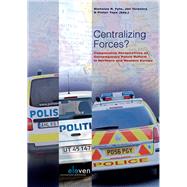Centralizing Forces? Comparative Perspectives on Contemporary Police Reform in Northern and Western Europe
, by Fyfe, Nicholas R.; Terpstra, Jan; Tops, Pieter- ISBN: 9789462360594 | 9462360596
- Cover: Paperback
- Copyright: 7/2/2013
Police organizations in several Northern and Western European countries have recently witnessed fundamental reforms to their structures, as well as to their relationships with governments. Many (but not all) of these macro-level reforms can be understood as forms of centralization. New or strengthened national police organizations have been created, with new territorial arrangements for delivering police services, involving the establishment of new structures of police governance and accountability. Written by highly experienced researchers, the essays in Centralizing Forces? reveal intriguing similarities and differences in police reform in eight European countries: France, Denmark, Finland, Belgium, England/Wales, Scotland, the Netherlands, and Sweden. The chapters examine the nature and dimensions of police reform and the importance of the political, cultural, social, and economic contexts in which reform is happening. Despite some significant similarities in the reform process, the book illustrates that there are important differences in the backgrounds, nature, and consequences of police reform. Police reform is therefore strongly "context dependent," not only in its underlying drivers and motives, but also in its cultural meaning and the resulting problems and challenges. The cumulative insights are evidence of how police reform is strongly linked to changing views about the role of the police in contemporary society, the shifting balance of power relations between key actors, and on political assumptions about the preferred relationships between the public police and national governments. Centralizing Forces? therefore provides critical insights into police reform in different national contexts and is a snapshot of a dynamic European policing landscape in which the contours of the relationships between police organizations, governments, and citizens are being redrawn.







